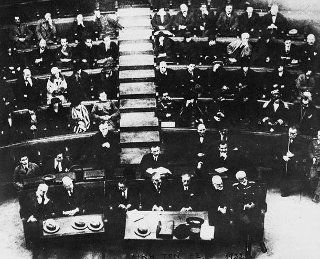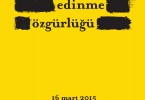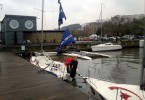Niyazi Dalyancı
The Supreme Court of Greece decided to reopen an 88-year old case which had resulted with the execution of six politicians and army commanders found responsible for what the Greeks term as the “Great Catastrophe,” that is the defeat of the Greek armies by the Kemalist forces in Asia Minor in 1922.
The court decided to reopen the case upon a request by Michalis Protopapadakis, the grandson of Petros Protopapadakis, the prime minister of Greece who faced the firing squad on 15 November 1922 along with five others.
“My grandfather was not a traitor,” Michalis Protopapadakis told the Greek media. He claimed that there was new evidence indicating that the accused were innocent. Protopapadakis mentioned a telegram by Eleftherios Venizelos demanding the suspension of executions, that arrived in Athens 14 hours after the death sentences were carried out.
In November, last year, the Penal Department of the Greek Supreme Court discussed the demand by Protopapadakis and decided by 3 votes against 2 to take the case to the Plenary Session. In an in camera session, the General Assembly of the Supreme Court voted in favor of a rehearing of the case known as the Trial of the Six.
Historical Background
Events that unraveled in the opposite shores of the Aegean after the Turkish armies entered Izmir on 9 September 1922 are little known in Turkey. As the Greek forces evacuated Izmir, hundreds of thousands of Anatolian Greeks had massed in the port, hoping to board a vessel that would take them to Greece. Then the city went up in flames creating mayhem for the refugees. The exact number of those who perished during the evacuation is still not known.
As the Greek army retreated, a group of officers headed by colonels Nikolaos Plastiras and Stylianos Gonatas on the island of Chios, just across from Izmir, staged a coup demanding from King Constantine to abdicate, his government to resign and those responsible for the defeat to be punished. In Athens General Theodoros Pangalos, the grandfather and the namesake of the present Deputy Prime Minister of Greece, supported the coup.
The King left Greece for Sicily, Italy, abdicating in favor of his eldest son George. He was never going to return to Greece. The royalist government resigned and a new government composed of politicians supporting former Prime Minister Eleftherios Venizelos took power under the control of the so-called “Revolutionary Committee.”
Politically turbulent years in Greece that preceded the debacle in Anatolia have primary significance in order to understand the events that took place during 1922. It was a period marked with endless struggles between the royalists and Venizelists. At the beginning of World War I, King Constantine was suspected by both the Allies and the Venizelists of having sympathies with Germany and it was rumored that he had secretly entered into a pact with the Germans. On the other hand, Venizelos and his supporters were strongly allied with Britain and France.
From the beginning of World War I in 1914, the power struggle between King Constantine and Venizelos took the form of a political seesaw until 1922 when the Greek monarch finally lost the struggle against his prime minister.
In 1915 when Venizelos offered the Allies to commit 60,000 Greek troops for their war effort, the King used this as a pretext to fire the prime minister. But two years later it was Venizelos’ turn to get rid of the King with British and French backing. King Constantine’s German sympathies were after all a family affair. He was married to Princess Sophie, the sister of the German Emperor Kaiser Wilhelm II. As Constantine left Greece with his family to exile in Switzerland his second son Alexander was proclaimed monarch by the Venizelists.
In 1919, Venizelos with British support landed the Greek army in Izmir starting the so-called Asia Minor campaign that did not go smoothly as expected. As the military campaign in Anatolia protracted reaction in the Greek public against mobilization and the financial burden of the campaign began to surface.
1920 was a turning point in the seesaw game between Venizelos and the royalists. In October, King Alexander while taking a stroll in the royal gardens of his Tatoi Palace was bitten by two monkeys and died of gangrene. Venizelos’ efforts to install Paul, the older son of Constantine, on the throne are thwarted by the prince’s refusal. So Constantine came back to become monarch for the second time.
1920 was not a good year for Venizelos. He had narrowly escaped an assassination attempt in Paris for which his supporters blamed the royalists. In November, elections were held and Venizelos lost against the royalists who campaigned on a populist platform of ending mobilization and hostilities, reforming the labor law, cutting taxes, etc.
The Allies declared that they will not recognize Constantine and withdrew their support from Greece, although in a December plebiscite 99 percent of the Greek people voted in favor of King Constantine.
Winston Churchill would later write in his memoirs referring to these changes in Greece that followed Alexander’s death and the defeat in Anatolia that “it is perhaps no exaggeration that a quarter of a million people died from this monkey bite!”
With Venizelos now in exile King Constantine issued a declaration that Greece will continue the military campaign in Anatolia. In March 1921 Greek forces launched another offensive, but they were stopped by the Turkish forces under the command of Ismet Pasha at Inonu. Ismet Pasha would later choose Inonu as his family name.
“Don’t you see what Kemal is doing to you?”
In Athens political leaders and the King blamed Greek military commanders for the failure. In April Demetrios Gounaris, the new Greek Prime Minister asked Ioannis Metaxas, a German-trained general who had participated in the Balkan War and considered as a military genious, to command the next Greek offensive in Anatolia. Metaxas refused saying that Greece did not stand a chance to win the war in Turkey. “Don’t you see what Kemal is doing? He is doing what the Russians did to Napoleon by pulling his armies into the depth of Russia to strangle them,” Metaxas had said reportedly.
But by this time hardly anybody except the British Prime Minister Lloyd George among the Allies were supporting the Greek campaign. The French and the Italians had withdrawn their support from Greece and they were sending out feelers to come to an agreement with the Ankara government.
In July, the Greek armies launched another offensive this time occupying Afyonkarahisar and Eskisehir. Mustafa Kemal pulled back his forces behind the river Sakarya, within 80 kilometers of Ankara preparing for the Greeks’ final assault. In August one of the bloodiest battles of the Anatolian campaign took place along the Sakarya river. After 22 days of battle the Greek offensive was repulsed by the Kemalist forces.
“Between the summer of 1921 and the summer of 1922, a lull prevailed on the battlefield, during which Prime Minister Gounaris and his Foreign Minister journeyed west to seek aid from the Allies. On the continent of Europe they met with little sympathy. In London they sat in the ambassadors’ waiting room at the Foreign Office, hat in hand, waiting for Lord Curzon somehow to solve their problems. Lloyd George told them, ‘Personally I am a friend of Greece, but…all my colleagues are against me. And I cannot be of any use to you. It is impossible, impossible.”
This is how David Fromkin, the historian and the author of “A Peace to End All Peace” describes the Allies attitude towards Greece in 1921 in his book.
But it was again Lloyd George who told Venizelos, then a private citizen without any political function, in London in the spring of 1922 that he would not “shake hands with a Greek again who went back upon his country’s aims in Smyrna (Izmir).”
A year after the Sakarya battle the Turkish offensive against the Greeks was launched on the morning of August 26 resulting with the routing of the Greek forces that retreated to Izmir in disarray. On the night of September 2, Gen. Nikolaos Trikoupis and Gen. Dighenis were captured by the Turkish forces.
“Mustafa Kemal offered coffee and cigarettes to the captive generals and asked whether there was anything he could do for them. Trikoupis requested only that his family should be informed of his fate. Mustafa Kemal, to whom all manner of vices have been imputed, relished the opportunity to demonstrate that he was a civilized officer and gentleman. Trikoupis learned in captivity, that he had been appointed commander of the entire front. It was a joke in bad taste,” writes Andrew Mango in his biography of Kemal Ataturk.
Earlier in May 1922, Commander-in-Chief of Greek forces in Asia Minor Gen. Anastasios Papoulas had been replaced by Gen. Georgios Hadjanestis; a decision that would have fatal consequences for the latter.
The trial of the six
After the withdrawal of the Greek troops from Anatolian soil, the military junta that took power in search for scapegoats arrested almost all the politicians who served in consecutive governments during the Asia Minor campaign including former prime ministers Gounaris, Nikolaos Stratos and Petros Protopapadakis. Gen. Hadjanestis, Gen. Michalis Goudas, Admiral Xenophon Stratigos and former War Minister Nikolaos Theotokis were also arrested. King Constantine’s brother Prince Andrew who was in the island of Corfu was also arrested and brought to Athens. Prince Andrew is the father of Prince Philip who would later marry Princes Elizabeth of Britain and become the Duke of Edinburgh.
In October a special military tribunal that included Theodoros Pangalos and Alexandros Othoneos began its hearings. Both Pangalos and Othoneos had earlier expressed their opinion in favor of summary executions without trial. But there was enormous pressure coming from Europe in general and Britain in particular for a fair trial of the accused.
It goes without saying that the trial was far from being fair. There were limitations on defense and appeal of the sentences was not allowed. On November 15th death sentences against six of the nine defendants were announced. They were Gounaris, Stratos, Protopapadakis, Theotokis, former foreign minister Georgios Baltatzis and Gen. Hadjanestis. Gen. Goudas and Adm. Stratigos received life imprisonment.
During the trial the defendants were denied access to documents that they might have used in their defense. Only former Prime Minister Gounaris handed in a 67-page defense which was not taken into account.
After hearing the indictment Gounaris said, “There is nothing that can be supported in this indictment and this worries me. They have already decided to convict us and they do not even make any effort to create seemingly powerful arguments.” He added that he was sure that the tribunal would hand down a death penalty that is why he preferred to submit a written defense so that it would remain for future generations.
Gen. Hadjanestis complained that he had only served for four months as the commander of the Asia Minor campaign whereas his predecessor served for 20 months. “It is not fair to hold me responsible because the Asia Minor campaign died in my hands,” he protested.
At a separate trial later Prince Andrew who had accompanied ex-King Constantine to Izmir and Eskisehir a year before, was found “not guilty” because of “completely lacking in military command experience.” He was later evacuated from Greece on a British warship.
After the death sentences were announced Britain threatened “not to defend Greece at the Lausanne negotiations and break relations with Athens” if the executions were carried out.
While the British envoy, Captain Talbot was on his way aboard a warship bringing the ultimatum to Athens, Pangalos hastened to the office of Plastiras, the chief of the junta, on the morning of November 28, asking him to speed up the executions.
The six were taken to military grounds near Goudi barracks just outside Athens that afternoon and executed by firing squad. All asked not to be blindfolded while facing the firing squad.
Now the Supreme Court of Greece which is referred to as Arios Pagos, the rock opposite Acropolis where the ancient Athenians used to hold court, will reopen this 88-year that may end with the rehabilitation of the six who bore the brunt of the Greek defeat in Anatolia while those who conducted the policies of so-called Great Powers and who were actually responsible for the tragedy went scot-free.







